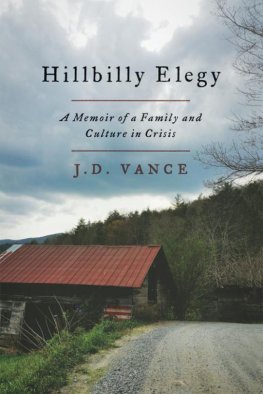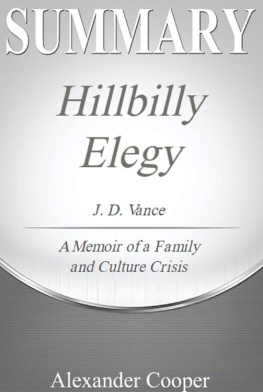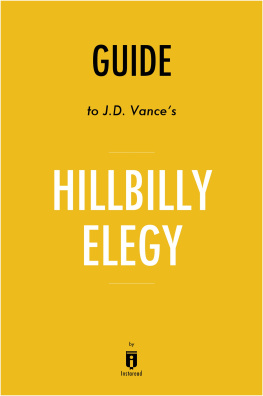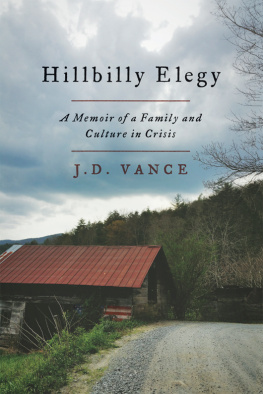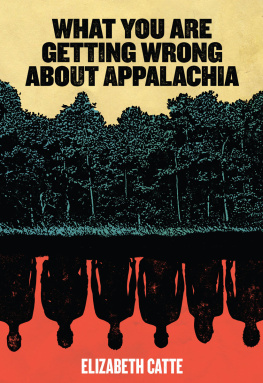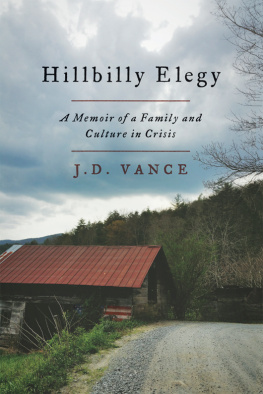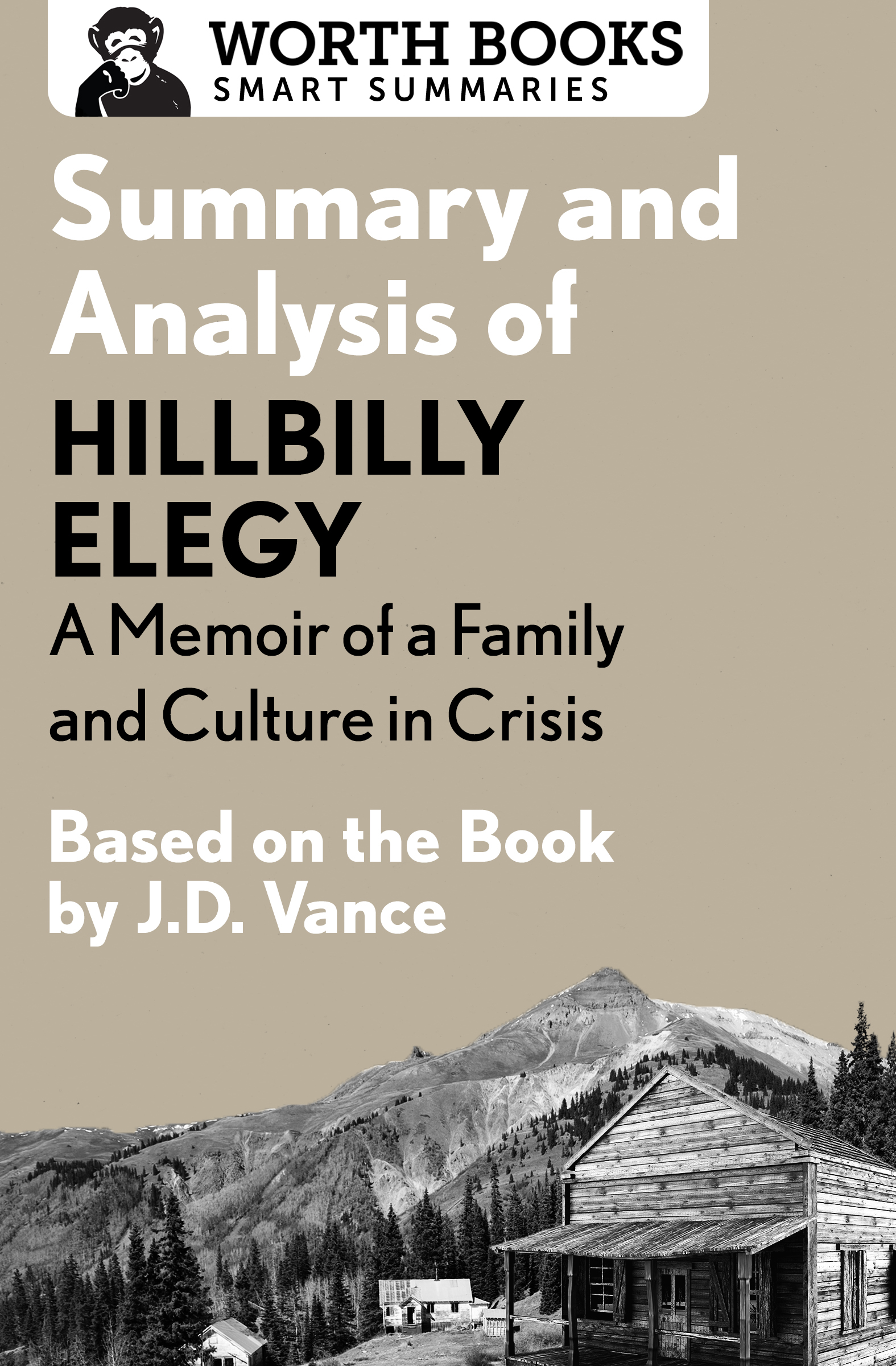Summary and Analysis of
Hillbilly Elegy
A Memoir of a Family and Culture in Crisis
Based on the Book by J.D. Vance

Contents
Context
Hillbilly Elegy is written as a response to J.D. Vances own experiences and observations growing up in Appalachia, where working-class whites are mired in poverty and the difficulties it brings with itfrom drug addiction and young, single motherhood to violence and incarceration. Vance examines the myriad reasons for the plight of his people, from the perspective of one who has risen above his social and economic class to become a conservative, Yale-educated lawyer. But more than a story of the ups and downs of a life in poverty, it is an analysis of why the hillbilly culture fails to prosper, and how both political parties are failing the people of the Rust Belt. As such, it is an extremely timely workone that looks closely at why, perhaps, this group has embraced Donald Trump, and why our country is divided along class lines more staunchly than ever before. It provides criticism of the political system and of his people themselves, and offers potential solutions for narrowing the class divide. In American Conservative , Rod Dreher wrote, Hillbilly Elegy does for poor white people what Ta-Nehisi Coatess book [ Between the World and Me ] did for poor black people: give them voice and presence in the public square. In fact, Vance often argues that hillbillies have more in common with the blacks of the urban ghettos than with other white people. Hillbilly Elegy has been received by both the left and the right as an important, must-read account for anyone trying to understandand activate positive changein the current landscape of our nation. However, the book also has its critics, from both sidessome who see Vance as a Trump explainer who downplays the rampant racism and sexism in his culture, others from his own culture who believe he unfairly portrays them as lazy welfare abusers, ultimately responsible for their own desperation.
Overview
Hillbilly Elegy is a fascinatingand, at times, deeply disturbingmemoir by a successful, Ivy-league lawyer who grew up a hillbilly (a member of the white working-class poor) in Jackson, Kentucky, and Middletown, Ohio. As Vance looks back on both the trauma of a childhood marred by violence, poverty, and substance abuse, while also depicting deep love and loyalty towards his family (particularly his grandparents), he takes on difficult questions about class and upward mobility, and what it means to feel disenfranchised in your own country. Tracing the huge migration of hill people from Appalachia to the Midwest in the 1950swhen big companies sought workers and provided otherwise luckless families a chance at the American Dreamthe book looks at all the ways this displacement both helped and hindered an entire culture. Vance has the unique perspective of having lived in two worldsthe haves and the have-notsand he shares both his deep-seated concerns and his buoyant optimism. For anyone who seeks to understand the rural conservatives, and how an entire segment of the population transformed from New Deal Democrats to right-wing Republicans, this highly personal account will shed light on many issues, while also telling a unique coming-of-age story, full of larger-than-life characters that are impossible to truly pigeonhole.
Summary
Introduction
J.D. introduces himself to the reader and lays out his reasons for writing the book. He grew up in the Rust Belt, in a failing steel town in Ohio. His family has always been poor, and very few have ever attended college. His mother, struggling with addiction for most of his life, sent him to be raised by his grandparents. As a troubled teen, he almost flunked out of high school. His story is nothing new to Americas white working class, where poverty is a family tradition.
Vance is a self-described hillbilly, whose family can be traced back to the Scots-Irish immigrants that settled in the Appalachian Mountains in the 18th century. The white working class is a pessimistic bunchcommunities are plagued with drug addiction and poverty and social mobility is difficult. They are isolated, and the rate of unemployment is high. But the problem isnt just the lack of jobs, Vance points outthere is also a disinterest in hard work.
Hillbilly Elegy is Vances attempt to tell a true and honest story about what it means to be a working-class white person in Americathe good, the bad, and the ugly included.
Chapter 1
J.D. Vance describes his childhood summers in Jackson, Kentucky, the home of his beloved great-grandmother and the place where he found solace from his single mother and her string of unsavory relationships. For a young boy in the heart of coal country, the surrounding mountains were a paradise, and his uncles, all of them hillbillies, were a source of awe and admiration to himdespite their often violent tendencies. In fact, its this violenceor more precisely, the act of taking justice into ones own hands when a wrong is committedthat Vance believes characterizes Appalachian culture. My people were extreme, but extreme in the service of something. However, as he matures and returns for a visit to Jackson, he finds his romantic views of hill people have changed somewhat. The poverty is heartbreaking, and drugs have infiltrated the community. The schools are terrible, and health care is virtually non-existent. Yet, when confronted with the truths of their existence, there is a stubbornness that Vance says is ingrained in Appalachians from an early agea tendency that may allow for psychological resilience to change. He still loves his people and considers himself a hill person despite his Ivy League education, but hes deeply troubled by how much the townand similar communities to which his relatives have migratedhave worsened.
Chapter 2
After World War II, in need of labor, Midwestern companies recruited families from Kentucky coal country and other mountain towns of Tennessee and West Virginia. The result was a great hillbilly migration from Appalachia to the Midwestern steel mills such as Middletown, Ohio, where Vances grandparents settled as young, married teens. They had few prospects in Jackson, Kentucky, and were excited about new opportunities. The number of migrants was overwhelming, with 13 of every 100 Kentucky residents leaving the state. Ultimately, those who left fared better, financially, in the long run, but it wasnt an easy transition. The hillbillies faced stigma both from their own communities, who felt theyd abandoned their homes, and from the middle-class Midwesterners who considered their new Appalachian neighbors crude (indeed, there was some justification for itVance tells a story of his grandparents tearing apart a pharmacy and verbally terrorizing a shop owner who reprimanded their son for playing with a toy in the store). Also, uprooted from their extended families, the hill people found themselves without the traditional family structure to teach them about marriage and childrearing, and to help with the workload of raising a family and making a living. Despite these issues, Vance emphasizes that his grandparents believed fervently in hard work and the American Dream, and became New Deal Democrats because they saw it as the party that protected working folks. By the 1950s (spanning two generations), the transplanted hillbillies were on financial par with the established Midwesterners. However, the majority still felt deep ties to their homeland and regularly made trips back to Appalachian country.








